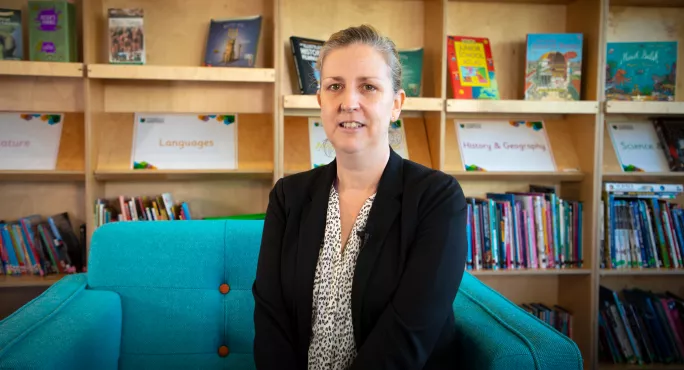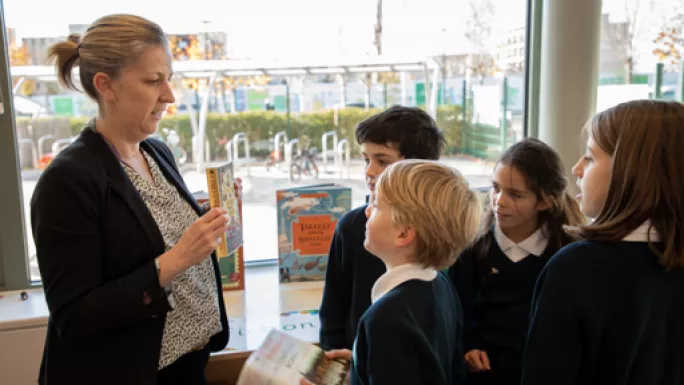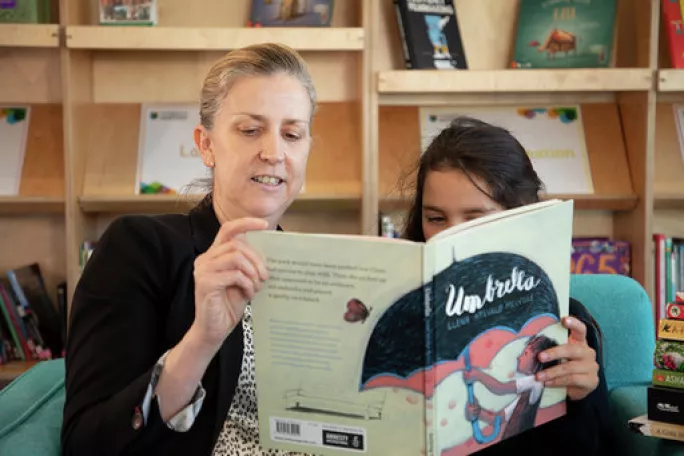
- Home
- Schools’ ‘invisible’ TAs need recognition not snobbery
Schools’ ‘invisible’ TAs need recognition not snobbery

Aimee Durning has achieved a more influential position than many teaching assistants. She’s written a chapter in a book on educational research and, unusually, is part of her school’s senior leadership team.
But what’s most amazing about the Tes Award winner is that she can correctly guess what books you like to read.
Watch: Five ways to excel as a teaching assistant
Read: Education secretary shows ‘unusual empathy’ for TAs
School funding: Should parents be teaching assistants?
Tips: How teaching assistants can boost behaviour
Uncannily, she predicts that Tes reads crime fiction, late at night, and only reads two pages, then instantly forgets them.
It’s a skill that comes in handy when suggesting books children might like at her school - the University of Cambridge Primary School, in the city of the same name.
“I know what sort of book a child might enjoy because I know what they’re like, and what sort of lessons they’ve liked, and I’ve talked to them, not just about education, but I know about their life, their family and what they like to do, and whether they have a cat or a dog - that sort of thing.”
Durning, who has shared her five ways to excel as a teaching assistant in a Tes video, has a good knowledge of children’s books because she reads around three per fortnight, and she has built up her own “mini library” in school.
Books she might recommend for a child could be anything from a Beano comic to a graphic novel of the Hound of the Baskervilles or, say, a novel such as Explorer by Katherine Rundell.
It’s no surprise that an Ofsted inspector said in a report on the school: “The school’s senior teaching assistant is an impressive champion of the joy of reading.”
‘Let’s deploy TAs in a different way’But it’s not just children books.
In being named classroom support assistant of the year in this year’s Tes Schools Awards, Durning was praised by judges for using academic literature to inform her own practice.
After reading research by Professor Rob Webster of the UCL’s Institute of Education (Maximising the Impact of Teaching Assistants) she told her headteacher James Biddulph that he needed to deploy TAs in a different way.
And he listened to her.
“Why wouldn’t I?” he says. “She was working at grass roots level and she’d read the literature. I might be the head but I don’t know everything.”
As a result, the TA-pupil relationship might be somewhat different at the University of Cambridge primary school than it is in other schools.
In fact, it’s described as “not like Velcro” but more like “elastic banding” where a TA moves in and out when supporting a child.
“We like to just step back and wait until the child needs support,” says Durning.

“We let every child have a go [on their own] first, so the child doesn’t become dependent on an adult and isn’t waiting to be spoon-fed information.
“Instead they’re actively learning in class and listening and taking part, and not thinking, ‘why have I got an adult next to me?’
“It better for them to talk to a partner before they talk to an adult. It’s so much better for them to hear things from a peer than from me.”
It’s an approach which was praised by Ofsted inspectors, who couldn’t identify who the special needs children were, says Durning.
“In other schools you could definitely say ‘that’s the child’ because the adult would be sat next to them.”
Shift in focus
Another difference of the role of teaching assistants at the University of Cambridge Primary School, compared to other schools, is that they don’t tend to get too involved with teacher admin, or chores such as sharpening pencils or helping put up displays or photocopying.
But what they will do, for example, is take the whole class while the teacher works with special needs pupils, or they might support one particular table.
“The focus is on working with the children,” says Durning. “Of course you’re assisting the teacher, but the main focus should always be the children.”
It’s a role which has been reflected in the name change with teaching assistants at the school now being called “learning coaches”.
Snobbery towards TAsTes judges also noted the voluntary work Durning does for the Chartered College of Teaching.
It involves running a regional hub which provides teaching assistants with professional development.
The 45-year-old also believes she’s the only TA in the country to be running a reading-for-pleasure group which is attended by senior leaders and teaching assistants alike, to which they bring along the children’s books they’ve read and share research they’ve heard about.
“There are thousands of teaching assistants out there like myself who, given half the chance - and if their senior leaders believed in them and they were given the opportunity - they could do exactly what I’ve done,” she says.
“If only research was shared with them, best practice was embedded and they were involved within meetings.”
But the reality is that teaching assistants are “an invisible workforce”, Durning says. “We’re ignored by the government time and time again.
“In the latest SEND report from the Education Committee we’re mentioned twice - that we need more training. And when the Special Needs Code of Practice came out I think we got three mentions.”
There is also a “snobbery” against teaching assistants, she says.
Sometimes, for example, she’ll be ignored by headteachers when she emails them (yet they will respond to Dr Biddulph).
“There’s a snobbery within the education world,” she says. “I’m not saying we should be seen as equal to teachers - because I’m not saying we’re teachers - but we’re all in the game to help children and so we have to work more together.”
Reading - the key to other worlds
Durning is paid “a little bit more” than a higher-level teaching assistant to reflect her role in the senior leadership team, which involves managing the school’s 20 other TAs.

And you could say it’s a role she’s well prepared for because in a past life she completed a management training scheme with Sainsbury’s (after finishing her A levels).
She became a department manager working across various parts of a store such as checkouts, the grocery, deli, and the “fresh counter” - but quit after five years when she had her first son.
She doesn’t doubt that a career with Sainsbury’s would have been better paid, but she isn’t driven by money.
“I’d rather be poor and happy,” she says.
Durning eventually found her niche after her second son started school when she began volunteering there as a parent reader, and decided she liked the role so took the level 2 teaching assistant course.
She stayed at the school for almost nine years, but became disillusioned because of its streaming policy.
The streaming began after baseline tests, and after that the school would only put resources into pupils who were likely to do well in Sats, says Durning.
“You’re writing them off at the age of 6 based on baseline. I’ve seen children not just in my old school but in other schools who weren’t reading at Year 2 and still not really reading at Year 6 because they haven’t had the input, and because reading for pleasure isn’t embedded within the school and isn’t in the school development plan.”
She adds: “If children can read it’s the key to it all. It’s the key to other worlds and finding out how other people live across the globe and to walk in other people’s footsteps.
“We hope that in 20 years’ time our pupils will be compassionate citizens and you can only have compassion for people if you understand what lives they live.”
The next chapter
The book to which Durning has contributed a chapter comes out in January.
It’s been written by Professor Teresa Kremin from the Open University, and is about professional development.
At the risk of oversimplification, Durning’s chapter is about children’s literature and embedding it in your school using research.
She’s also studying for a degree in primary education with the Open University.
But when she’s qualified she doesn’t want to be a teacher, but to either go into research or develop her role within her school. You get the feeling that one day soon headteachers will definitely be replying to her emails.
Aimee Durning CV
1985-1990: 5 GCSES grade C and above, Netherhall School, Cambridge
1990-92: A levels at Cambridge Regional College
1992-98: Sainsbury’s Management training Scheme
1998-2001: stay-at-home mother
2001-04: volunteer playgroup committee member
2004-07: parent helper
2007-15: Teaching assistant at a local primary school. Working across both key stages
2007-08: Level 2 OCR Teaching Assistant Qualification
2015-present: The University of Cambridge Primary School (UCPS), lead learning coach
2016-17: Level 3 NCFE & CACHE teaching assistant qualification
2018-present: Chartered College of Teaching regional Hub event organiser for TA Twilight Forum (CPD)
2018-present: Open University degree in teaching and learning in the primary years
Register with Tes and you can read five free articles every month, plus you'll have access to our range of award-winning newsletters.
Keep reading for just £4.90 per month
You've reached your limit of free articles this month. Subscribe for £4.90 per month for three months and get:
- Unlimited access to all Tes magazine content
- Exclusive subscriber-only stories
- Award-winning email newsletters
You've reached your limit of free articles this month. Subscribe for £4.90 per month for three months and get:
- Unlimited access to all Tes magazine content
- Exclusive subscriber-only stories
- Award-winning email newsletters



